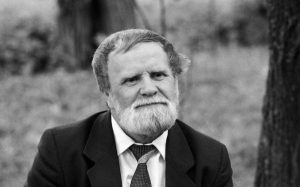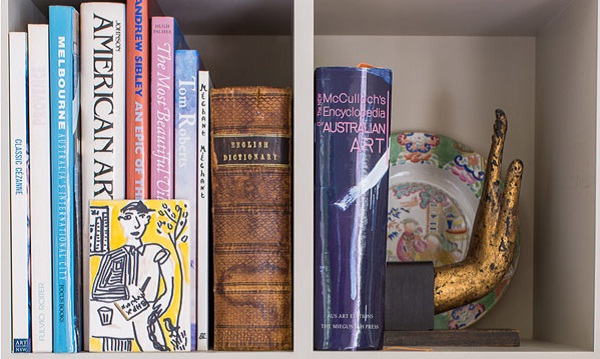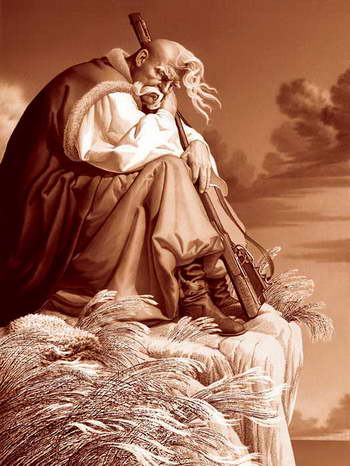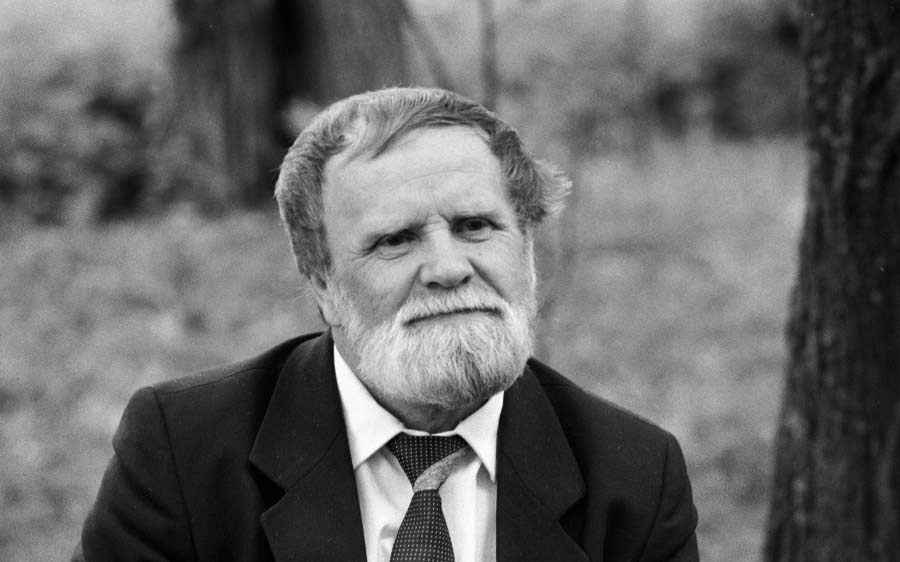Vasily Belov “Everything is ahead”
 “Everything is ahead” (1986). – After a ravnavnogo immersion in the irrevocable Russian past, Belov, the more painful it was to feel inappropriate in the uncomfortable present, in the swarming stream of modern life, could not but feel himself in conflict with it. And then – he bravely took to resist this flow? and even affect its course? By comparing the 1st and 2nd parts of this little novel, it can be understood that the resolution did not immediately gain in it.
“Everything is ahead” (1986). – After a ravnavnogo immersion in the irrevocable Russian past, Belov, the more painful it was to feel inappropriate in the uncomfortable present, in the swarming stream of modern life, could not but feel himself in conflict with it. And then – he bravely took to resist this flow? and even affect its course? By comparing the 1st and 2nd parts of this little novel, it can be understood that the resolution did not immediately gain in it.
All ahead. The screen version of the novel by the famous writer-pochvennik Vasily Belov, raising the problems of the detrimental effect of Western civilization on the Russian mentality. Belarusfilm, 1990
In this novel, he abruptly changed the style of writing, learned (however, not for the first time) the lively and biting manner of a completely modern Moscow writer, as if he gave himself to this whirlwind of telephone calls, throwing in a taxi through the streets (always calling them with certainty) and even – what really would not expect from Belov! – began with a tourist trip preferential (politically proven) Muscovites to France. (However, these pages are boring, we almost don’t see France, just a tourist trick, but the author probably wanted to, just wonder: how did he fit in on such a trip?) At the same time, the new notes that sounded in Soviet life just in the middle 80, Belov ignores (yes, he takes the action 10 years earlier) and collects the reader’s attention on the emptiness of depraved manners and the breakup of families. And the examples are easily strung, they are really a lot around.
In the tone of the author is growing irritation. And this tone goes through the whole book and spoils it. By itself, irritation cannot be the driving force of artistic success. But first, the author is not limited to edification (they say, today’s women do not want children, but men want irritation against women), but builds a very plausible plot of 7 or 8 characters, connected with each other, or akin to, or by former sharing in one school class, and with the whole 1st part it convincingly conveys a nervous, clouded situation, typical metropolitan scenes (everyone has a lot of free time, they easily handle office hours), and dynamically bring them to a dramatic denouement. And limit the author to his novel by this 1st part – he would embody his edifications only in artistic form, and we could only accuse him of the extreme lack of expression of the main characters – Medvedev, Brish (about him – only a few times, that he has long legs , lanky, more – no sign) and narcologist Ivanov, who is increasingly instructed to express the author, but he is some kind of inexpressively wooden, and, persistently fighting against drunkenness, he himself lashes alcohol all the time. (However, everyone also drinks alongside and drinks – a defect that is rooted in the educated class.) In the novel, there are quite a few random scenes, insignificant littered dialogues, and even whole pages feel like extraneous inserts. And one more thing: the humor is completely unsuccessful, some shabby city jokes, idle jokes, and even awkward reading. You finish the 1st part with a feeling: all this is spiritually inconsistent. And the language Belova – faded away, it is not. Fee for changing manners?
However, Belov adds a 2nd part. Action jerk postponed for 10 years.
Dmitry Medvedev is a candidate (“almost doctor”) of sciences, a physicist from a secret research institute (“an academic was sitting on his hook”), according to the old school name “going ahead”, “uncommon will”, ahead of his rivals in marriage to fellow schoolgirl beauty Luba, in the 1st part, he suspected her (with reason) to betray her, he washed down in an explosion of anger (we remember vividly: drunk sits on the couch barefoot, in Turkish and “the tie dangled on his powerful neck, like a rope on a collective-farm bull”), Medvedev, Chopin’s lover, and still singing Mussorgsky’s “Flea” for an accident on his own A retaliatory retrial (and abandoning a bogus fraudulent medical bulletin), Medvedev, all spiritually updated, reappears after 10 years of complete silence. We find out that he served 6 years (and there were more, ahead of schedule, then 3 years away from Moscow), now, alone, building a dryer at Moscow State Farm near Moscow – but there are no signs that over the years he was looking for a former family or any of his friends the same narcologist discovers him by chance.
The author does not tell us how and what Medvedev spiritually lived these 10 years. But here he is again vigorous, let go of a thick chestnut beard, “almost everything that understands, is strong, almost free,” and is it anxious to express his program? “The idea of the forgotten Medvedev swiftness, of his mind and energy, has returned again” – are we waiting for the superman? I didn’t have time to say two words with the narcologist – I’ve already quoted Gogol, Tyutchev and Tvardovsky. Volley: “Scientific and technological revolution? Bullshit! ”“ I am a conservative, an inveterate retrograde, and imagine, I am even proud of it a little. Stop the need to race industry. Almost all of our research institutes simply drive money. Physical labor is the natural need of a normal person.



